Beefed Up Charging
Indiana electric co-ops host, support statewide electric vehicle high-speed charger network
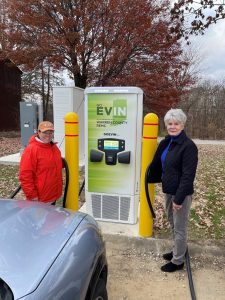
Joan Soller, director of risk management and regulatory affairs at Wabash Valley Power Alliance, with Beef House Restaurant co-owner Bonnie Wright at the new electric vehicle charger installed at the restaurant in Covington, Ind.
Beef House Restaurant owner Bob Wright regularly encounters travelers meandering off the pair of nearby four-lane highways to stop in for a bite and a break.
Electric vehicle drivers can now also fill up their automobiles at the longtime western Indiana eatery.
The electric vehicle charger installed at the Beef House in November is one of more than 50 high-speed direct current fast charger stations in a new statewide network created by GO Electric Vehicle INdiana (GOEVIN). The collaboration consists of electric utilities in Indiana including Wabash Valley Power Alliance and its member cooperatives, the Indiana Department of Environmental Management and Drive Clean Indiana. The group is installing the high-speed chargers near major transportation corridors throughout the state. The Beef House worked with Warren County REMC, its local electric cooperative, and WVPA, the cooperative’s wholesale power provider, on the new charger.
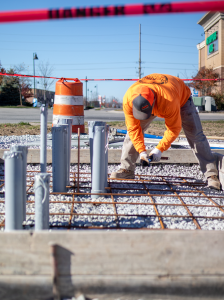
A contractor prepares for concrete to be poured for the GOEVIN charger installed in Whitestown, Ind., which is served by Boone REMC. Wabash Valley Power Alliance, which is part of GOEVIN, partnered with four member co-ops to install the chargers in their communities.
“I thought it was a good idea because when you’re traveling you want someplace to stop, and it takes a while to charge up your car or truck,” said Wright, whose family has owned the Beef House since its 1964 opening. “I thought a restaurant would be a good place since people can come in and eat.”
The statewide program received more than $6 million from the Indiana Volkswagen Mitigation Settlement for the new chargers. The funding came from the $2.9 billion Environmental Mitigation Trust as part of the Volkswagen Corp.’s settlement with the U.S. Justice Department, according to the IDEM website. Funding from the trust is to offset the excess air pollution emitted by Volkswagen vehicles that violated the Clean Air Act, IDEM reported.
The utilities in the GOEVIN collaboration are funding the remaining balance for the charging stations. EV owners will pay a fee to charge their vehicles at the stations.
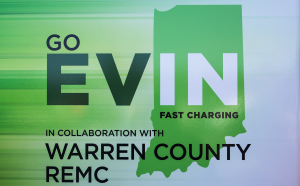
Each EV charger in the program features the GOEVIN logo. Wabash Valley Power Alliance partnered with four of its member electric cooperatives, including Warren County REMC, to install the new chargers.
“One of the greatest things about the GOEVIN initiative is that it’s truly a collaboration,” said Shawn Seals, senior environmental manager for IDEM. “We are somewhat the envy of the Midwest in that we have a genuine collaborative of utility groups working on EV infrastructure across the state.”
Each charging station, which can charge two vehicles simultaneously, was installed within about one mile of a major highway or thoroughfare. In addition to the Beef House, three other chargers are installed in locations served by WVPA member cooperatives: Fair Oaks Farms in Jasper County, served by Jasper County REMC; JJ’s Travel Plaza in Peru, Indiana, served by Miami-Cass REMC; and Meijer in Whitestown, Indiana, served by Boone REMC.
“Wabash Valley Power represents some of the state’s rural utility providers, and those folks are getting the same kind of attention, experience and equipment as our very large utility companies in the state,” Seals said. “It’s wonderful in that it created a level playing field for all the utilities that are participating.”
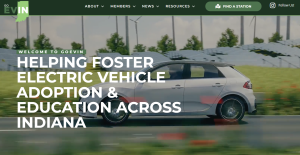
The GOEVIN website features information about the group, EV charger locations, and a calculator to compare fuel costs based on daily commute.
The group also created the website GoEVIN.com to educate people about EVs, charging, and rebates offered through the collaborative participants. The site includes a calculator for visitors to compare gas and electricity costs based on their daily commute.
“We’re all pioneers. This is the opportunity for us to learn together,” said Carl Lisek, executive director of Drive Clean Indiana. “This gives Hoosiers a choice to travel from northern Indiana to southern Indiana with collaboration on a branded program that people will be able to identify.”
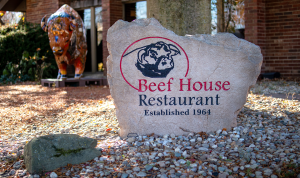
The Beef House in Covington, Ind., which hosts one of the more than 50 new direct current fast charger stations under construction along major Indiana highways and thoroughfares. The stations were installed by GO Electric Vehicle INdiana (GOEVIN), a collaborative effort of electric utilities including Wabash Valley Power Alliance and its member co-ops, the Indiana Department of Environmental Management and Drive Clean Indiana.
DCFC stations can fully charge an EV battery very quickly, said Joan Soller, director of risk management and regulatory affairs for WVPA. She often charges her Ford Mustang Mach-E in about 30 minutes when returning to her Indianapolis area home from visiting family in Ohio.
Wabash Valley Power owns a Tesla and regularly works with its member electric distribution cooperatives on public events to teach people about EVs. While some are intrigued, many have questions about charging vehicles on longer trips, Soller said.
“Range anxiety is still causing some people to be hesitant to purchase an electric vehicle,” she added. “This program will fill a very huge need in electric vehicle infrastructure.”
EV manufacturer Tesla already has an established charger network across the U.S., though this network will provide power to vehicles from other manufacturers, Soller said.
The Beef House, which welcomed the chance to partner with WVPA and Warren County REMC on the new program, has offered Tesla destination chargers in the restaurant’s parking lot for several years. About 10 Tesla owners visit the restaurant weekly and charge while getting a meal, said Wright, the restaurant owner. His family has owned several EVs, including a Ford Mustang Mach-E and Chevy Volt.
“The Midwest is probably the last place that’s gotten on the trend,” Wright said of electric vehicles, “but I think it’ll come around.”